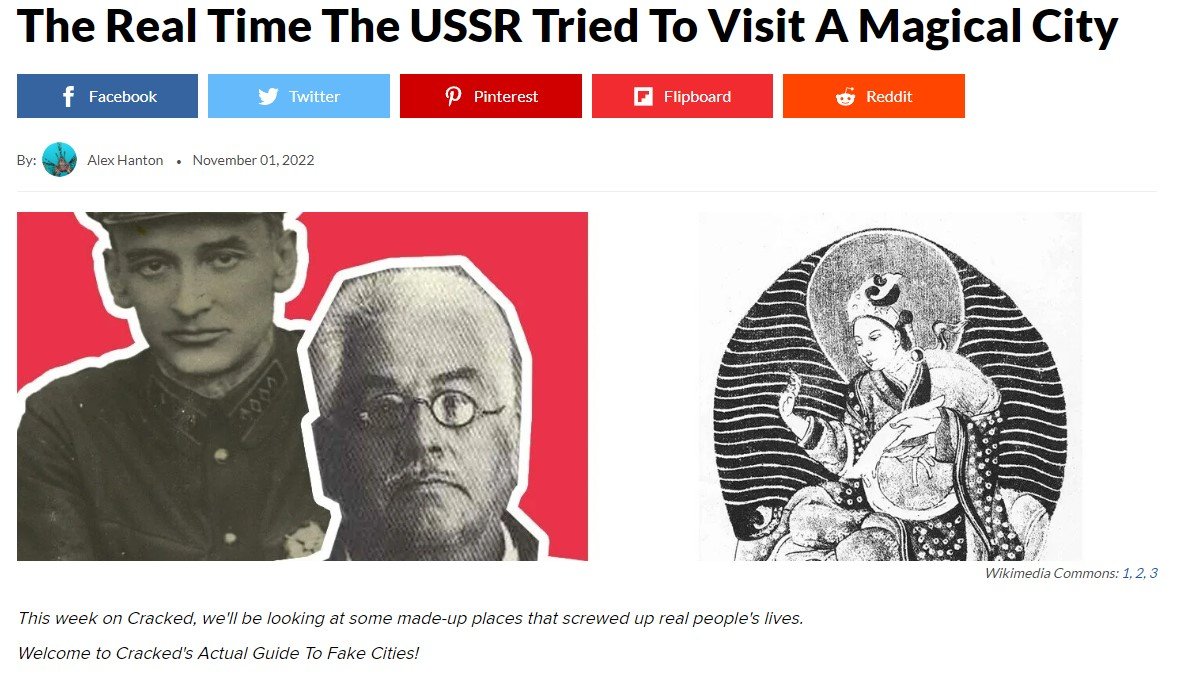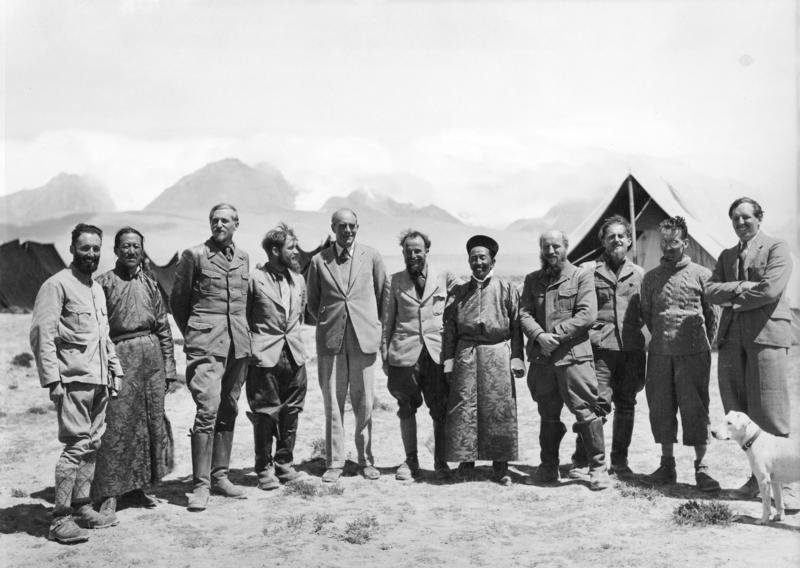Linkfest 2022-11-25: Lost Cities

Cracked: The Real Time The USSR Tried To Visit A Magical City
It wasn’t just the Nazis who were obsessed with the strategic implications of the occult.
19FortyFive: Read H. P. Lovecraft To Understand War
Weirdness, then, is about presence—the presence of something freaky and possibly otherworldly in normal surroundings. Fisher, in fact, deems “the irruption into this world of something from outside” to be “the marker of the weird.” He maintains that “the weird is a particular kind of perturbation. It involves a sensation of wrongness: a weird entity or object is so strange that it makes us feel that it should not exist, or at least it should not exist here. Yet if the entity or object is here, then the categories which we have up until now used to make sense of the world cannot be valid. The weird thing is not wrong, after all: it is our conceptions that must be inadequate.”
So weird fiction is as much about how human beings react to the presence of an anomaly as it is about the anomaly itself.

ÆtherCzar: Based Black Friday Book Sale
Lots of my online friends and acquaintances have books for sale right now!
Tablet: The Crushing Loneliness of the Girl Boss
When the COVID lockdowns began in March 2020—that great sterilization of our personal lives, that mass removal of distraction—I observed something strange. My peers, ordinarily proud of their independence, realized that they didn’t just love their families but kinda liked them. Other friends—friends who’d been stuck quarantining with roommates or, worse yet, alone—yearned for families. They began joking about how nice it’d be to have a husband and kids for company in eating or drinking themselves to death or, less gloomily, in sharing their freshly baked sourdoughs. With the mounting pressure of COVID restrictions, many people learned that their “chosen families” of friends and colleagues were less durable than they’d thought.
I wasn’t a detached onlooker. I, too, worked a tech job 3,000 miles away from my family, the kind located on a plush campus with floor-to-ceiling windows and on-demand gelato. Then suddenly the artifice was stripped away, and my time was no longer broken up by campus bike rides or leisurely strolls to the office sushi chef. I was alone facing the silence of the day, and I found myself confronted by questions I hadn’t asked since my early twenties: What am I for? Why am I doing any of this?
Church Life Journal: Holy Ghosts: On Purgatory and the Paranormal
After the death of her husband Peter Kaplan in late 2013, Lisa Chase and her young son Davey could not escape their sense of Peter’s enduring presence. As she related in a long-form essay about the experience, he dominated their dreams, and strange coincidences—in license plate numbers, the dates on pennies, odd text messages—seemed to point to him everywhere she went. One evening, Davey told his mom, “Daddy is with us now; he says he wants you to hold his hand.” Desperate, Lisa—by her own account a secular New Yorker, albeit with former astrological flirtations—finally contacted a medium.
When she returned Lisa’s call, the medium’s voice shifted, mid-conversation, from friendly to annoyed: “I don’t like to do it this way.” “What do you mean?” Lisa asked. “‘He’s here,’ she said. ‘He wants to talk now.’ Then, as if she were talking to someone else: ‘I like to get paid first.’ Then, addressing me, ‘Can you even do this now? Are you free?’” As Lisa relates the conversation, the medium—or rather, Peter by way of her—went on to tell her things that no one but Peter could have known, even pronouncing particular words with Peter’s characteristic inflection.

EXPEDITION MEMBERS WITH HOSTS IN GANGTOK, SIKKIM ARE (FROM LEFT TO RIGHT) UNKNOWN, UNKNOWN TIBETAN, BRUNO BEGER, ERNST SCHÄFER, SIR BASIL GOULD, KRAUSE, UNKNOWN TIBETAN, KARL WIENERT, EDMUND GEER, UNKNOWN, UNKNOWN
BY BUNDESARCHIV, BILD 135-KA-11-008 / CC-BY-SA 3.0, CC BY-SA 3.0 DE, HTTPS://COMMONS.WIKIMEDIA.ORG/W/INDEX.PHP?CURID=5338182
The Long View: Himmler's Crusade
Remarkable stories clustered around the Schäfer Expedition to Tibet of 1938-1939. The project was only one of several German expeditions to that part of the world at about the same time (the one that included Heinrich Harrer is perhaps the best known because of his memoir, Seven Years in Tibet), but the Schäfer Expedition had the backing of SS-Reichsführer Heinrich Himmler and of the Ahnenerbe, the research bureau reputed to be interested in the occult. Besides, it reached the then rarely visited holy city of Lhasa, and the Germans were known to have found favor with the ruling Regent.
With Both Hands: A Theology of Fiction
I am fascinated by the contributions of Sister Mariella Gable to American literature. Sr. Mariella was responsible for championing Flannery O’Connor and J. F. Powers, who even now still constitute what many people think of as “Catholic” fiction. Her life and influence is a testament to an idea I have been forming recently, that a relative handful of tastemakers have the ability to make or break reputations of writers and this will define for most people what good stories are, who after all do not read everything in order to make up their own minds.
Comments ()